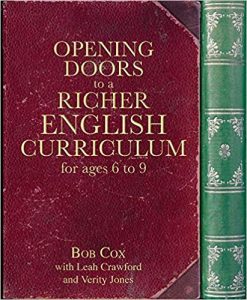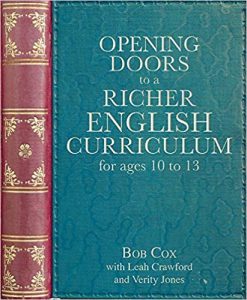If your school has development needs in relation to English, literacy and learning, get in touch.
Designing bespoke support to meet your needs and contexts is always possible.
The following courses can be commissioned by a single institution, a school cluster or Teaching School Alliance partnership. Commissions can and have often been from partners working in cross-phase settings. The number and length of sessions over time can be flexed to suit your needs: just get in touch.
Talk manifests and shapes thinking. Without well-facilitated dialogic talk, learners are unlikely to develop the language, the thinking processes or the self-regulation needed to do well in a demanding curriculum and more challenging revised national assessments. The dialogic mode has value beyond cognitive gains. Children who can engage in purposeful classroom dialogue are more likely to be active, tolerant and questioning citizens and decision makers.
The course:
- supports teachers to explore the principles of research in to dialogic talk (Alexander, Mercer, Myhill…),
- provides models and scaffolds to enact these principles in the English classroom and
- supports teachers to design their own teaching sequences
Two compelling forces are converging in the current climate.
- Spelling accuracy matters. At primary, both the demand and the scale of the spelling curriculum have been increased. At secondary, writing requirements within the revised GCSEs, not just in English, give greater weight to written accuracy. The assessment accountability for the school and the student matters more than ever.
- A learner’s breadth of receptive and productive vocabulary matters. It matters hugely for reading comprehension but also to anchor understanding of subject specific concepts. Networks of words help us to structure our thinking and secure our knowledge base.
The most current research on teaching spelling and vocabulary suggests that learning set lists of words each week for quick-fire tests does not lead to improved spelling at the point of composition, or sustained vocabulary acquisition.
For word study that does make a difference, teachers need to know:
- How to build words in English: principles and strategies
- How to teach strategies so that pupils become word studiers
- How to learn words: memory strategies
- How to teach vocabulary so that pupils build webs of meaning
Word study will improve the competence and confidence of your learners to spell but in a wider sense to be fascinated by words: how they mean and how they are built.
Grammar is the new black. Or at least, it is just as ubiquitous but perhaps slightly less popular.
In the primary phase, teachers at both key stages find themselves compelled to prepare children for decontextualised tests of grammar knowledge (ref. Grammar, punctuation and spelling SATs) and to ensure that their young writers use a specified range of grammatical constructions in independent composition in order to be assessed as working within age expectations as writers (ref. Interim Performance Descriptors.)
Working within this context is challenging. It is all too easy to find the teaching of grammar terminology dominating the English curriculum, squeezing out exploration of reading and writing that should be the core of English.
Guided by the research evidence from Debra Myhill et al at Exeter University, ‘Language as putty’ supports teachers to gain control of their English curriculum, embedding engaging and exploratory grammar teaching within reading and writing sequences. The teaching of grammar can indeed make a difference to progress in English but only if it is in service to exploring how writers make meanings.
The course content balances:
- The need to secure core principles for grammar teaching
- The development of teachers’ own grammar knowledge
- Exploring models of what effective teaching of grammar can look like
- Supporting teachers to develop their own teaching sequences with embedded approaches to grammar
‘Language as Putty’ has been successfully delivered to cross phase groups wanting to improve cohesion in teaching approaches between the primary and secondary phase and to solely secondary phase groups wanting to capitalise on and develop the improved grammar knowledge with which year 6 pupils now enter year 7.
The 2016 dip in reading SATs outcomes at KS1 and 2 was proof of what policy makers had warned. The revised reading curriculum and its assessment accountability measure is significantly more demanding.
This course would suit a single school or a cluster of primary schools wanting to rethink and refresh a coherent and principled, ‘blended’ reading provision, with the benefits of doing so collaboratively.
The group will explore:
- The component skills of reading comprehension and how good readers construct meanings by activating and co-ordinating these skills with improved self-regulation over time.
- The potential benefits and challenges of whole class reading sessions around a shared rich text.
- The guided reading construct: in what contexts is it likely to be essential, effective, optional?
- The importance of the reading culture, including teachers’ text selection, engagement and modelling of being a reader.
This course seizes the potential in the revised National Curriculum (2013) to refresh the principles behind and approaches to teaching writing across a school or department. Is the National Strategy sequence for teaching writing sufficient? What do we really mean by ‘talk for writing,’? What kind of talk, when and why? How can the teaching of grammar be integrated in to teaching sequences for writing?
The course constructs a framework of writing phases, within which teachers build a repertoire of teaching approaches, with the aim of creating writers, writers who adopt behaviours and reflect on processes, not just pieces of writing.
- planning teaching sequences that give pupils a reason to write,
- supporting pupils to generate content,
- bridging the transition from thoughts in the head to words on the page
- building the reviewing instinct, with audience and purpose in mind.
‘If you grow your story wings, you can fly’
A course devoted purely to the selection, integration and teaching of literature: stories and poems that explore our place in the world and what it means to be human. Enjoyment of reading and reading a breadth of texts with fluency and understanding is core to the revised National Curriculum (DfE 2013) but shared reading of literature holds a much deeper offer to every learner and to the community of the school.
Reading literature: developing deductive, creative and critical interpretations of text offers a range of personal and educational benefits that are hard to achieve through any other route. It develops problem-solving abilities: logical and creative thinking. It is the prime source of vocabulary development beyond the age of 7. It develops our capacity for empathy and tolerance. Reading in a community helps us feel we belong to the literate world and helps us know ourselves and others. It develops our inner ear for the rhythms and patterns of the written word, different as they are from spoken.
‘Being an enthusiastic and frequent reader is more of an advantage on its own than having well educated parents in good jobs.’ (PISA OECD report 2000)
The course supports schools or clusters to secure the centrality of stories and poems in their curriculum by:
- exploring what constitutes literary texts and how to select them
- exploring a repertoire of teaching approaches that can yield the deeper cognitive and affective benefits of reading
- exploring direct and indirect ways to use texts as springboards in to writing
Opening Doors supports schools to construct and confidently deliver a rich English curriculum with access and depth for all. In-house professional development is supported by the legacy of 5 published texts with 80 teaching units for the primary and KS3 classroom. The key principles of the Opening Doors approach, masterminded by Bob Cox are:
- Quality texts inspiring quality writing in interwoven journeys
- Enabling access for all with in-built ‘wings to fly’ opportunities to expand connections and explore possibilities
- The power of linked texts to build confidence and deep understanding of how texts work
- Integrated vocabulary and grammar to deepen understanding
See the dedicated Opening Doors area of my website and read more about the history and impact of Opening Doors on Bob Cox’s site here




